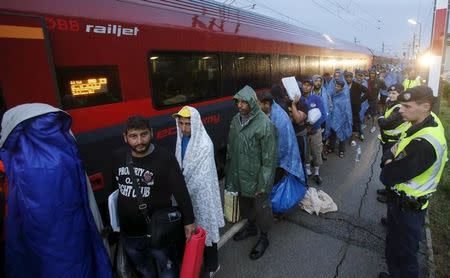Germans see refugees as biggest problem despite falling numbers

By Michelle Martin and Thorsten Severin BERLIN (Reuters) - More than half of Germans see refugees and integration as Germany's biggest problem, a survey showed on Friday, despite the number of newcomers falling significantly on the year. A record 890,000 mainly Muslim migrants from the Middle East, Africa and elsewhere arrived in Europe's largest economy in 2015, prompting concerns about security and integration. Arrivals have slowed this year, with the Federal Office for Migration and Refugees (BAMF) saying on Friday around 305,000 new asylum seekers were registered in its 'EASY' computer system in the first 11 months of 2016; but 'EASY' numbers are seen as too high as some migrants get registered more than once. The BAMF received 26,438 asylum applications in November - a fall of around 54 percent on the year. Nonetheless, a survey by pollster Forschungsgruppe Wahlen for broadcaster ZDF found 58 percent of Germans deem refugees and integration the most important problems facing Germany. Chancellor Angela Merkel's popularity has waned since migrants started arriving in large numbers last summer and she expects next year's federal election, in which she plans to run for a fourth term, to be "tough like no other". Merkel, whose conservatives have lost support to the anti-immigrant Alternative for Germany (AfD) party, hardened her stance on migrants' integration in Germany at a congress this week and her Christian Democrats (CDU) passed a resolution on tackling forced marriage and honour killings, and cracking down on dual citizenship. Sigmar Gabriel, leader of the Social Democrats (SPD), junior partner in Merkel's ruling coalition, accused the CDU of adopting the AfD's positions: "It's wrong to run along behind right-wing populists. That's exactly what the CDU is doing. And Merkel is allowing it," he told Passauer Neue Presse newspaper. Fifty percent of Germans think Merkel is doing a good job on refugee policy while 45 percent think her work in this area is "rather bad", the survey of 1,234 people conducted from Dec. 6 to 8 showed. Almost two-thirds (60 percent) worry that spending on refugees means money is being saved elsewhere and 52 percent fear that migration will push up crime rates. Just under a third (30 percent) fear that Germany's cultural and social values are under threat due to the refugees. Newspaper Die Welt said on its website that migrants from North Africa were seldom deported from Germany. It cited an answer from the government to a question from the opposition far-left Linke party as saying that a combined total of 281 Moroccans, Tunisians and Algerians had been deported from Germany in the first three quarters of 2016 after more than 13,000 North Africans arrived here last year. Around three-quarters (14,463) of all migrants deported (19,914) from Germany in the first three quarters were from the West Balkans, it said. (additional reporting by Holger Hansen and Gernot Heller; Writing by Michelle Martin; editing by Ralph Boulton and Andrew Hay)

